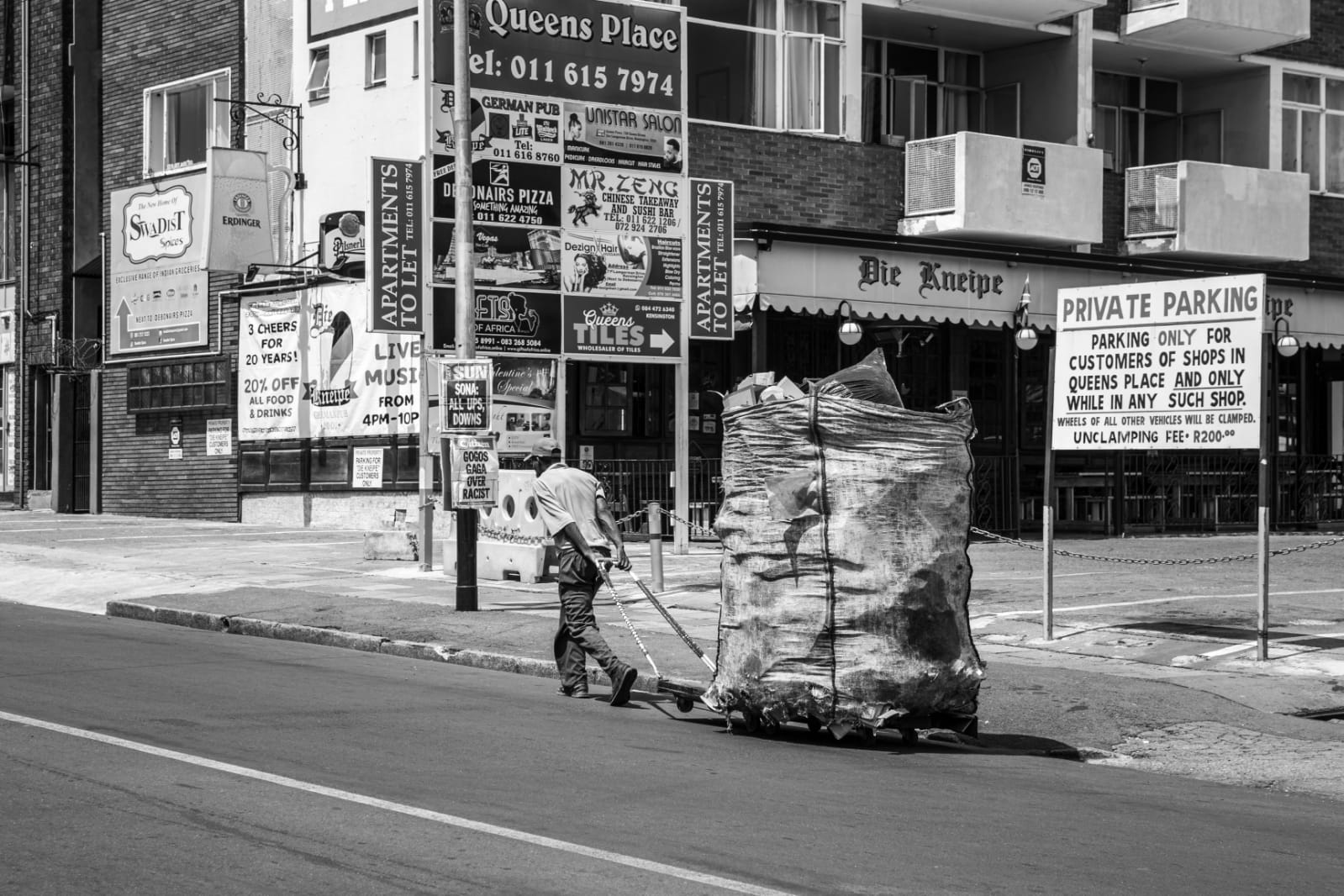MATERIAL TOPOGRAPHIES//
Material Topographies is a data-driven, civic art mapping project capturing Reclaimer’s movement, impact, and experiences.

Photograph by Zivanai Matagni
Johannesburg is a city propped up by entrepreneurs. Be it beauticians, traders, or car washers the life and livelihood of the city happens on pavements and streets - open to the hustle and motion around them. In Material Topographies we want to explore this movement and exposure of the city through the experiences of waste management entrepreneurs, known as Reclaimers. Navigating the city in search of salvageable materials – often for tens of kilometres per day, and applying their skills to divert waste from landfills, Reclaimers represent the city’s flow, it’s entrepreneurial spirit of bootstrapping, and it’s harsh economic and environmental realities.
According to the African Reclaimers Organization (ARO), Reclaimers are “responsible for collecting over 90% of all materials that are recycled in South Africa,” closing a significant gap on the low levels of household recycling in the country. Despite the fact that the work Reclaimers do saves South African municipalities up to R750 million a year (EU 37 million), and makes our recycling rates comparable to Europe, Reclaimers are not compensated appropriately for their time, skills, or environmental contributions. Often, their only income is from the sale of waste and they have no protections against the physical risks they face, no health insurance, no workers compensation, and no reliable wage for the service they provide.
At its most simple, Material Topographies is a data-driven, civic art mapping project which captures Reclaimer’s daily journeys, the types of material they collect, the distance they travel, and their daily experiences. For this project, we have worked with Reclaimers to develop two limited edition maps that bring attention to the mechanisms and processes behind Reclaimer’s work, and the heavy lifting they do for the city of Johannesburg. Over a period of five days, this information was collected by a team of Reclaimers who received a stipend of R2 500 to carry a GPS device with them while they work, collect receipts, and write in a journal.
Through the journals, we were able to connect with and capture the more emotional and human side of waste reclamation work. A pattern that emerged across all the journals was that time put into work did not mean the got a reliable income - this stress of instability was reflected in each Reclaimer’s writings. In the journals, one of the Reclaimers mentioned that they, unlike the other Reclaimers, had not been able to afford a trolley to transport their materials. This limitation was reflected in their daily income, as even though they covered a further distance than the other Reclaimers each day, they earned the least over the week - on one day earning only R13.50.
‘Someone just destroyed my day by assaulting me on the road. When some people see me doing recycling they think I’m crazy or taking substances or drugs. But I don’t care what they say, I still do my work.’
Another big source of stress for the Reclaimers was their interactions on the street. In one case a Reclaimer had significant swelling on their leg after being knocked by a truck, but still carried on working the next day. In another case, a Reclaimer experienced assault, describing it saying ‘someone just destroyed my day by assaulting me on the road. When some people see me doing recycling they think I’m crazy or taking substances or drugs. But I don’t care what they say, I still do my work.’
Over the 5 days of data collection, the team of Reclaimers diverted an estimated 2441.94 kg of material from landfill, by covering an area of 7.16km2. The materials salvaged included: polyethylene terephthalate (PET) clear; PET green; polypropylene (PP); green glass bottles; H1 I; K4 cardboard; aluminium cans; steel (processed, and subgrade); white paper; steel wire; heavy duty bottles; and light steel. We chose to represent this immense work through maps using Tableau. Below you can explore what each Reclaimer’s days and week look like both individually and collectively:
Through a long process of masking and tracing, we remodelled the above maps into visually striking depictions of the areas that the Reclaimers service. By overlaying each Reclaimer’s weekly journey and displaying them in similar tones, we hoped to communicate the Reclaimer’s oneness - how, although they act separately from one another, they work for the same cause and goal.
Over 5 days, the team of Reclaimers diverted an estimated 2441.94 kg of material from landfill.
Our work culminated into two series of limited edition prints on cotton paper. By creating artistic representations of Reclaimer’s work to be held in people's homes or work-spaces, we hope they will serve not just as reminders of the incredible environmental impact of Reclaimers and the insufficient remuneration they receive for their back-breaking work, but also as provocations to rethink what we consider as “waste.” In demonstrating the value of what we traditionally discard, we can highlight the thousands of livelihoods built around material management in Johannesburg. We intend for Material Topographies to broaden the conversation around extending the life cycle of discarded materials, and the people who manage our waste. Showing the Reclaimers journey in relation to motion of the city, we can see the positive impacts more expansive waste intervention can have at each level by nurturing civic-engagement, environmentalism, and supporting our informal economies. The prints are an edition of 22 and the bag prints are an edition of 5. These works were screenprinted on a cotton-paper by Flood House at Victoria Yards, Johannesburg.
This project is in partnership with the Goethe-Institut South Africa as part of the Goethe-Institut Project Space (GPS). The overall goal for Material Topographies is to bring awareness to the journey of discarded materials through our city, the significance of Reclaimer-input into the material management system, and the fundamental need for Reclaimer-informed decision making as we work towards an environmentally inclusive future.